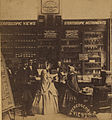 | |
| Founded | 1825 [1] |
|---|---|
| Founder | Daniel Appleton |
| Defunct | 1933 |
| Successor |
|
| Country of origin | United States |
| Headquarters location | New York City, U.S. |
| Key people | |
D. Appleton & Company was an American publishing company founded by Daniel Appleton, who opened a general store which included books. He published his first book in 1831. The company's publications gradually extended over the entire field of literature. It issued the works of contemporary scientists, including those of Herbert Spencer, John Tyndall, Thomas Huxley, Charles Darwin, and others, at reasonable prices. Medical books formed a special department, and books in the Spanish language for the South America market, including the works of Rafael Pombo, were a specialty which the firm made its own. In belles lettres and American history, it had a strong list of names among its authors. [2] On June 2, 1933, D. Appleton & Company merged with The Century Company. [3]



